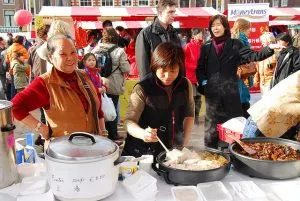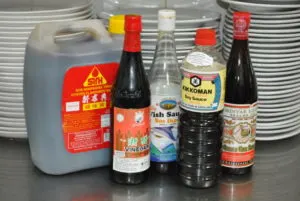The purpose of marinating the meat
Marinating meat is one of the Chinese cuisine’s most common yet important steps. Essentially, marinate means to add a certain flavor to the meat to:
1. Flavor the meat– The flavor of the herbs, spices, and seasonings in the marinade penetrates the interior of the meat. This step is especially important for stir-frying as the seasonings have a relatively short time to penetrate the meat during the cooking process.
2. Tenderize the meat – The tenderizing effect is somewhat less effective, but it depends on the constituent of the marinade. Egg whites and baking soda are the common items used to tenderize the meat. Pork chops will become much tender after marinating for a few hours.
3. As part of the sauce – The marinade can also be used as part of the ingredients for making the sauce during the cooking process.
4. It improves the browning characteristics that are the goal of high-heat cooking.
Note: This post may contain affiliate links. Please read my privacy policy for more info. I may receive commissions for purchases made through links in this post. As an Amazon Associate, I earn from qualifying purchases.
Common ingredients used in Chinese marinade
Oil – Oil helps preserve the tenderness of food items, especially meat. Oil with a neutral flavor and high smoking points, such as peanut oil, palm oil, and corn oil, are used for Asian cooking. Oil also helps bind other marinade ingredients to the meat and enables it to be absorbed easily into the food pieces. Oil can be omitted if the meat is marinated for longer or contains plenty of oil, such as lamb.
Salt – Salt functions as a flavor and texture enhancer. It acts as a tenderizer by breaking down the tough protein of the meat.
Sugar – Just like salt, sugar act as a flavor enhancer. Sugar also speeds up the browning process of the meat during stir-frying.
Soy sauce – Soy sauce contains salt. Therefore, you need to reduce the amount of salt in the marinade. Soy sauce also has high umami and adds a savory flavor to the food.
- Light soy sauce is essentially for its savory flavor. Premium-grade light soy sauce is more suitable as a dipping sauce, or you can use it as the main ingredient for stir-frying. You may want to take a look at this fried rice recipe
- Dark soy sauce is less salty and with a caramelized flavor. The quantity required usually is less than light soy sauce. It is mainly used to provide a caramelized color to the stir-fry and render its unique taste to the meat.
Oyster sauce is one of the most commonly used seasoning items in Chinese cooking. It has a universal flavor virtually compatible with any herbs and spices, as well as different types of meat. You can substitute oyster sauce with mushroom extract (sold as a vegetarian oyster sauce). The flavor is somewhat milder.
Fish sauce can be used alone or in combination with soy sauce. It has a strong and unique Asian flavor. It is quite salty, so be careful not to add too much salt during stir-frying. it is widely used in Vietnamese and Thai food.
Worcestershire sauce is not a Chinese seasoning but has been used in many modern Chinese cuisines as part of the ingredient. Our popular oriental lamb chop is marinated with this sauce.
Acid (vinegar, lemon juice, lime juice) – These ingredients help to tenderize the meat. Besides, they also add flavor to the meat. However, acid tends to coagulate the protein of the meat and change its appearance, similar to partially cooked. Therefore, be careful not to overuse any acidic ingredients for marination.
Flour is used for marinating, especially deep frying or stir-frying. The small amount of flour protects the meat from burning too fast during frying. It also helps to bind other seasoning ingredients together and adhere to the meat.
Cornstarch renders crispiness to the meat for deep frying. It can be added partly during the marination, and the remainder coats the meat for deep-frying. Other alternatives are potato starch and wheat starch.
Herbs, seasoning, and spices – Items such as pepper, garlic, and ginger juice, are commonly used to marinate in Asian cooking. Minced the garlic finely before adding it to the meat, and use ginger juice to marinate it.
Wine – The most commonly used wine for marinating is Shaoxing wine (绍兴酒). It adds an unmistakable Asian flavor to any meat dish. Alternatively, you can use sherry as a substitute.
Here is a short video to show the whole marinating process
Three types of Chinese marinade
There are three types of marinade. Whether it’s chicken, pork, or beef, the basics of marinating are the same.
Wet marinade – This is the most common type if it is intended to marinate for a long time. The marinade should mix well with the meat and be kept in the chiller. If you want to store it for a longer period, say a few days or a week, you can keep it in the freezer. However, it is important to let the marinade penetrate the interior before freezing it. The marinated meat can be kept in the chiller for about six to twelve hours before transferring it to the freezer.
Dry marinade – Dry marinate, also called spice rub or dry rub. It is a mixture of spices, herbs, and salt rubbed or patted onto the surface of the meat. This technique is widely used for preparing roast or barbecue items such as roast chicken. The time required to marinate before cooking depends on the size of the meat. It will take longer; preferably marinate overnight for a whole chicken. The dry marinade is also used to prepare Peking duck and Cantonese-style crispy fried chicken
Instant / quick marinade – This is useful to add flavor to smaller pieces of meat or fish fillet before deep-frying or stir-frying. My standard marinade for stir-frying is as below:-
- 150g of meat (chicken, pork, or beef)
- 1/8 teaspoon of corn flour
- 1/4 tablespoon of light soy sauce
- 1/4 teaspoon of vegetable oil
- 1/2 teaspoon of wine (optional)
- 1/2 teaspoon sesame oil
- a dash of white pepper
Mix all the above ingredients and leave them for at least 15 – 30 minutes before stir-frying.
You may notice that the amount of soy sauce is very small, and there is no salt in the formula. This is because we will add extra flavor (salt, soy sauce, or oyster) during the stir-frying process.
The texture of any meat that has been marinated will be tender and smoother.
Four tips for marinating meat
- Keep in the refrigerator to avoid bacteria growth
- Use sufficient marinate to cover the entire food item. Alternatively, turn the food items occasionally to ensure even marination.
- Use the acid-resistant container to keep the food items in the chiller. Stainless steel and glass containers are good choices.
- Do not add minced aromatics such as garlic, onion, or spring onion to the marinade if you are intended to stir-fry. Stir-frying requires intense heat, and these minced aromatic will be burned easily. Use garlic and ginger juice instead.



Chicken biryani recipe - how to cook the best rice dish in the world
Thursday 30th of March 2017
[…] ingredients of the marinade differ slightly from different region and countries. However, there is similarity among all the […]
Pandan Leaf Chicken- Easy Thai Recipe
Friday 8th of July 2016
[…] Marinate the chicken. The marinade provides a slightly spicy and earthy flavor, while the pandan leaves impart the delicate, inviting aroma to the chicken. […]
Chicken Adobo Recipe
Sunday 15th of May 2016
[…] liked it enough to name it and write about it. The name they chose, adobo, basically means marinade. However, this form of marinating is quite different from traditional Spanish […]
Easy Asian Recipes- How to Cook Eggplants and Tofu Dishes
Monday 9th of May 2016
[…] the dining table within 30 minutes. I also think that passive cooking time should not be included. Marinating may require more than an hour or even overnight but there is nothing to be done after placing it in […]
Parmesan Crusted Chicken recipe with Asian Flavor
Monday 24th of August 2015
[…] marinate the chicken thigh fillet (most recipes exclude marination) because chicken thigh is tougher and […]